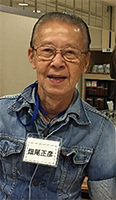学会誌
論文抄録
『医学教育』49巻・第1号【抄録】2018年02月25日
1. 医学教育研究から論文発表への道
大滝 純司*1 武田 裕子*2
*1 北海道大学医学教育推進センター,Hokkaido University Center for Medical Education
*2 順天堂大学医学部医学教育研究室,Division of Medical Education, School of Medicine, Juntendo University
2. 論文執筆者へのメッセージ:編集委員会の議論から
福島 統*
*日本医学教育学会 第16期~第18期 編集委員長, 東京慈恵会医科大学教育センター,Center for Medical Education,Jikei University School of Medicine
3. 医学教育研究を進めるための5つの秘訣: 私の医学教育研究活動から
菊川 誠*
*九州大学大学院医学教育院医学教育学部門,School of Medicine Graduate School of Medical Sciences Faculty of Medical Sciences, Kyushu University
4. 論文執筆を支援する:助言者の立場から
石川 ひろの*
*東京大学大学院医学系研究科医療コミュニケーション学,The University of Tokyo, Graduate School of Medicine, Department of Health Communication
5. 査読者が「採択」を決める5つのポイント
椎橋 実智男*
*埼玉医科大学 情報技術支援推進センター,Information Technology Center, Saitama Medical University, Saitama, Japan
板家 朗*1 鬼塚 千絵*1 永松 浩*1 今福 輪太郎*2 木尾 哲朗*1
要旨:
背景:研修歯科医が主体的に診療に参加するようになる成長のプロセスを明らかにする.
方法:16名の研修歯科医を対象に臨床研修中の成長について半構造化インタビューを行い,修正版グラウンデッド・セオリー・アプローチにより分析を行った.
結果:研修の早期は指示通りの診療をしていた.その経験を振り返ることや指導医からの助言を通して診療の方法が確立した.そして自己の能力の理解が進んだ.1口腔の診療を考えるようになり主体的に診療に参加できるようになった.
考察:学習者が主体的に診療に参加するためには,教育者は診療の現場で学習者が個々の問題を解決するように促す足場や支援を提供する必要がある.
キーワード:臨床研修,研修歯科医,workplace learning,質的研究
Akira ITAYA*1 Chie ONIZUKA*1 Hiroshi NAGAMATSU*1
Rintaro IMAFUKU*2 Tetsuro KONOO*1
Abstract:
Introduction: This study aims to explore the processes by which trainee dentists are able to autonomously engage in clinical practice.
Methods: Semi-structured interviews with 16 trainee dentists were conducted. For the data analysis, Modified Grounded Theory Approach was employed in this study.
Results: At the early stage of clinical education, trainees tended to passively receive and follow the supervisor’s instruction. However, through their reiterative reflection on clinical experience and feedback from their supervisor, they gradually established a proper way of treating and caring for patients. They also understood their own abilities. Furthermore, they could obtain a holistic viewpoint of dental treatment. Their experiences led to active engagement with dental practice.
Discussion: In order for the learners to be autonomously involved in their practice, educators need to provide scaffolding and support that encourage them to solve individual problems in the given context.
Key words: clinical training, trainee dentists, workplace learning, qualitative research
*1九州歯科大学口腔機能学講座総合診療学分野,Division of Comprehensive Dentistry, Department of Oral Function, Kyushu Dental University, Fukuoka, Japan
[〒803-8580 福岡県北九州市小倉北区真鶴2-6-1]
*2岐阜大学医学教育開発研究センター,Medical Education Development Center, Gifu University, Gifu, Japan
受付:2017年8月8日,受理:2018年1月19日
-卒前の多職種連携教育の意義-
榎田 めぐみ*1 鈴木 久義*2 片岡 竜太*3 今福 輪太郎*4
小倉 浩*5 刑部 慶太朗*5 下司 映一*1
要旨:
目的:本研究では卒前に多職種連携教育を受けた学生が身につけた能力を明らかにし,教育的な示唆を得ることを目的とする.
方法:学生のポートフォリオを質的に検討した.
結果・考察:卒前の多職種連携教育により学生が身につけた能力は[患者中心のチーム医療の実践],[多職種連携のための価値観/倫理の涵養],[多職種連携のためのコミュニケーション],[他の専門職の役割/責任の理解],[自己の専門職の役割/責任の理解],[チームとチームワーク]の6つの要素から形成された.これらの能力を修得するためには,多職種連携教育を通じて多職種連携実践をする能力を確実に身につけられる卒前教育プログラムの必要性が示唆された.
キーワード:多職種連携実践,多職種連携教育,コンピテンシー
Megumi ENOKIDA*1 Hisayoshi SUZUKI*2 Ryuta KATAOKA*3 Rintaro IMAFUKU*4
Hiroshi OGURA*5 Keitaro OSAKABE*5 Eiichi GESHI*1
Abstract:
The purpose of this study is to address what undergraduate students of professional healthcare learned in interprofessional education (IPE), and to explore a way to develop interprofessional work (IPW) competencies effectively in IPE.
A qualitative analysis was conducted on the portfolios of 9 medical, 8 dental, 16 pharmaceutical, and 16 nursing and rehabilitation students.
6 elements were identified in the undergraduate IPE;【Patient/Family-Centered care】,【Value/Ethics for IPW】,【Communication Necessary for IPW】,【Roles/Responsibilities as Healthcare Professionals】,【Understanding of their own profession】,【Team/Team work】.
In order to acquire these capabilities, undergraduate education programs based on IPE are required.
Key words: Interprofessional Work, Interprofessional Education, Competency
*1 昭和大学大学院保健医療学研究科,Showa University Graduate School of Health Sciences
[〒226-8555 神奈川県横浜市緑区十日市場町1865]
*2 昭和大学保健医療学部,Showa University School of Nursing and Rehabilitation Sciences
*3 昭和大学歯学部,Showa University School of Dentistry
*4 岐阜大学医学教育開発研究センター,Medical Education Development Center, Gifu University
*5 昭和大学富士吉田教育部,Showa University Faculty of Arts and Sciences at Fujiyoshida
受付:2016年12月15日,受理:2018年1月19日
中川 晋*1 高橋 弘明*2 小西 靖彦*3 青松 棟吉*4 石原 慎*5
清水 貴子*6 高橋 誠*7 望月 篤*8 安井 浩樹*9
要旨:
初期臨床研修後の専門医教育は,医師教育の根幹にある.我が国の専門医制度は,当初,各学会が独自に設立したものであったが,2014年の日本専門医機構発足に伴い,標準化が図られている.
2018年4月から新整備指針に基づく新専門医制度がスタートする.プロフェッショナルオートノミーによる専門医の質保証を行い,国民に信頼され受診の良い指標となる制度作りが目指されている.
学部教育同様,卒後教育においても国際標準が求められる時代となりつつあり,卒前・卒後を通じた医師のアウトカム設定,研修現場での評価の実現が望まれる.
キーワード:専門医制度,日本専門医機構,世界医学連盟,現場での評価,卒前・卒後のシームレスな教育
Japan Society for Medical Education,Postgraduate Medical Education Committee Susumu NAKAGAWA*1 Hiroaki TAKAHASHI*2 Yasuhiko KONISHI*3
Muneyoshi AOMATSU*4 Shin ISHIHARA*5 Takako SHIMIZU*6
Makoto TAKAHASHI*7 Atsushi MOCHIZUKI*8 Hiroki YASUI*9
Abstract
Medical education towards a specialty is a core stage of training for medical doctors.The specialty training system in Japan was initially organized by various academic societies and was recently integrated under Japan Medical Specialty Board, which was established in 2014.From April 2018, a revised specialty training system will begin and be based on new program guidelines.Its main concepts are professional autonomy, quality assurance of the medical specialty board and trustworthy medical consultation.As with undergraduate education, global standards are recently required in postgraduate education.Consistent outcome policy throughout undergraduate and postgraduate education and workplace-based assessment can hopefully be established.
Key words: Specialty training, Japan Medical Specialty Board, World Federation for Medical Education, workplace-based assessment, continuity of undergraduate and postgraduate educations
*1 東京都済生会中央病院人材育成センター,Center for Human Resource Development, Tokyo Saiseikai Central hospital
[〒108-0073 東京都港区三田1-4-17]
*2 岩手県立中央病院医療研修部,Department of Medical Education, Iwate Prefectural Central Hospital
*3 京都大学医学教育・国際化推進センター,Medical Education Center, Kyoto University
*4 佐久総合病院研修医教育科,Department of Medical Education, Saku Central Hospital
*5 藤田保健衛生大学地域医療学,Department of Community Medicine, Fujita Health University
*6 聖隷福祉事業団顧問,Adviser, Headquarters, Seirei Social Welfare Community
*7 東京医科歯科大学総合教育研修センター,Department of Medical Education Research and Development, Tokyo Medical and Dental University
*8 聖マリアンナ医科大学医学教育文化部門医学教育研究分野,Research Institute for Medical Education, St. Marianna University School of Medicine
*9 美幌町国民健康保険病院(呼吸器内科),National Insurance Bihoro Municipal Hospital
受付:2018年1月19日,受理:2018年1月20日
いつも「どう評価するか」を考えてやってきた-それは懸田賞受賞から始まった
村上 純子*
Junko MURAKAMI
*埼玉協同病院臨床検査科, Department of Clinical Laboratory Medicine, Saitama Cooperative Hospital
訃 報

ここに生前のご功績を偲び,謹んで哀悼の意を表します.
ご略歴
1960年金沢大学医学部卒業,1967年京都大学医学研究科外科学,同年倉敷中央病院外科医長,1973年日本赤十字社武蔵野赤十字病院外科,のちに外科部長,1994年日本赤十字武蔵野短期大学教授,2008年日本赤十字看護大学教授,同年日本赤十字秋田看護大学教授,等を歴任.1985年-2003年日本医学教育学会運営委員,1977年日本小児外科学会評議員,1993年日本POS医療学会評議員・理事,等の要職に就く.
「医学教育」誌,第45巻第2号,特別企画「温故知新:指導医養成講習会について畑尾正彦先生にうかがう」を再掲するに当たって
―畑尾正彦先生追悼文―――――――――――――――――――――――――岩﨑 榮
伴 信太郎
日下 隼人
福島 統
清水 貴子
野村 英樹
吉田 素文
岐阜大学 医学教育開発研究センター 藤崎和彦
片岡 義裕
賀來 敦
アンプロフェッショナルな行動をとる医学生・研修医に対する指導
〜発達障害を抱える医学生・研修医への対応を中心に〜




